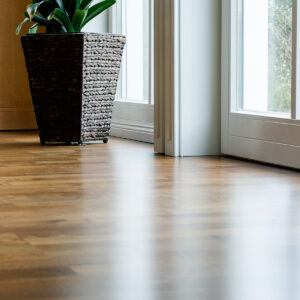 When it comes to choosing the right flooring for your home, there are many options to consider. Two popular choices are laminate flooring and vinyl flooring. While both types of flooring offer advantages, they also have their own unique drawbacks. In this blog post, we'll explore the differences between laminate flooring and vinyl flooring to help you make an informed decision.
When it comes to choosing the right flooring for your home, there are many options to consider. Two popular choices are laminate flooring and vinyl flooring. While both types of flooring offer advantages, they also have their own unique drawbacks. In this blog post, we'll explore the differences between laminate flooring and vinyl flooring to help you make an informed decision.
Laminate Flooring
Laminate flooring is a popular choice for homeowners who want the look of hardwood flooring without the high cost. Laminate flooring is made of a composite wood core with a printed image of wood grain on the surface. It's then covered with a clear protective layer to give it durability and resistance to wear and tear.
Advantages of Laminate Flooring:
- Cost-effective: Laminate flooring is generally less expensive than hardwood flooring, making it a great option for homeowners on a budget.
- Easy to install: Laminate flooring is designed to be easy to install, with many options featuring a click-and-lock installation system that doesn't require glue or nails.
- Durable: Laminate flooring is scratch-resistant, making it a great option for households with children or pets.
- Easy to clean: Laminate flooring is easy to clean and maintain, with most messes being able to be wiped up with a damp cloth.
Disadvantages of Laminate Flooring:
- Not as authentic as hardwood: While laminate flooring can mimic the look of hardwood, it's not quite the same as the real thing.
- Can be slippery: Laminate flooring can be slippery when wet, which can be a hazard for young children or elderly individuals.
Vinyl Flooring
Vinyl flooring is a synthetic flooring option that is made of layers of PVC vinyl and a printed design layer. It's available in a variety of colors and patterns and can mimic the look of hardwood, stone, or tile.
Advantages of Vinyl Flooring:
- Water-resistant: Vinyl flooring is water-resistant, making it a great option for bathrooms, kitchens, and other areas where moisture is a concern.
- Durable: Vinyl flooring is designed to be durable and resistant to scratches and wear and tear.
- Soft underfoot: Vinyl flooring is softer underfoot than hardwood or tile, making it more comfortable to stand on for long periods of time.
- Easy to install: Vinyl flooring can be installed over existing flooring, making it a great option for DIY projects.
Disadvantages of Vinyl Flooring:
- Not as authentic as hardwood: While vinyl flooring can mimic the look of hardwood or tile, it's not quite the same as the real thing.
- Can be damaged by heavy furniture: Vinyl flooring can be damaged by heavy furniture or appliances if not properly protected.
Which One Is Right for You?
Ultimately, the decision between laminate flooring and vinyl flooring will depend on your specific needs and preferences. If you're on a budget and want the look of hardwood flooring, laminate flooring might be the right choice for you. If you're looking for a water-resistant option for your bathroom or kitchen, vinyl flooring might be a better choice.
At Go Flooring, we offer a wide selection of laminate and vinyl flooring options to suit your needs and style. Our team of experienced professionals can help you choose the right flooring for your home and provide expert installation services. Contact us today to learn more about how we can help you upgrade your home with beautiful, durable flooring.

